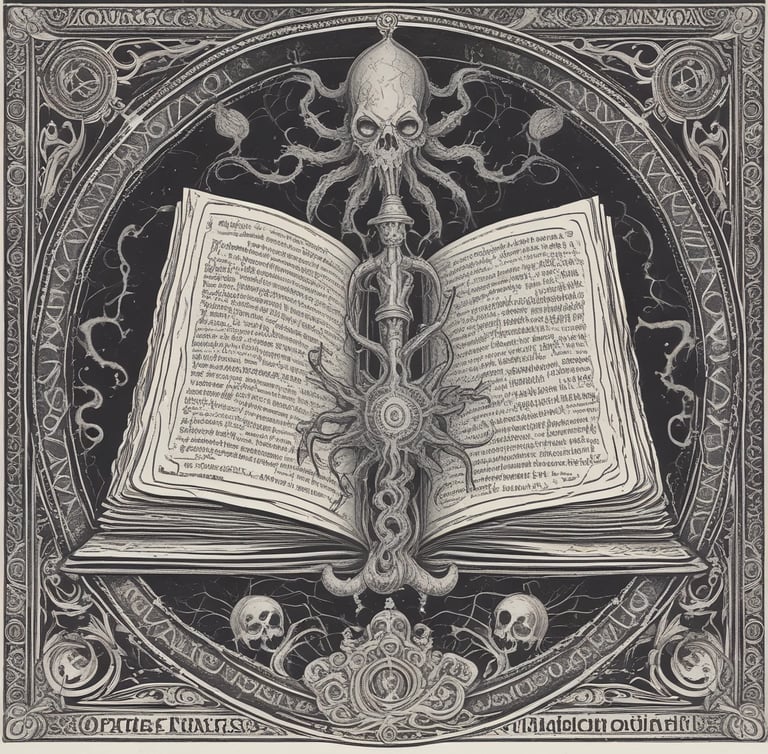Cursed Book: A Chilling Horror Story
Explore an original short horror story about a cursed book or grimoire that remembers its readers. Dive into chilling tales, captivating art, and insightful reviews centered around the dark magic of cursed books.
TERRIFYING STORIES
Marcel Helmar
9/25/202510 min read


Cursed Pages
"Original short story by Marcel Helmar; published here first."
They found the book in a darkened room that should have never exist in the house. The door opened on its own—no hinges, no frame, the wall simply thinning into a darken black mouth—and inside the room the air smelled of Sulphur and decay. The light there was distorted: not dim but inverted, a softness that seemed to come from below rather than above. On a low table, under a cloth that had the smell completely of death and burned paper, there laid a book bound in hide and was the color of frozen rust. A single sigil had been stamped into its cover, three concentric circles bitten with short, radial teeth like marks. Between those circles a tiny eye had been pressed, as if the book had been born to watch.
Elijah lifted the cloth because the devil loves idle hands. He had come to the house for reasons he couldn't fully understand: a hidden treasure, a rumor about a map, the thin thrill of touching something secret. He never expected to find the house reaching back for him.
The book was heavier than it looked. When he opened it, the pages breathed, a smell like ash and salt that made the skin on his neck prickle. Ink bled across the paper like crooked hands writing diagrams: circles within circles, letters that looked to be pinned from an unknown alphabet, and marginalia in a tiny, frantic script that looked like someone had written in the dark with trembling hands. There were notes about offerings and tides, about hours when the moon roar above the world like a demonic beast. There were enchantments, spells, recipes for smaller evils and remedies for larger, kinder sins. There were warnings too, the kind that arrive after the deed has already begun: DO NOT READ ALOUD; DO NOT REMOVE THE THIRD PAGE; DO NOT INVITE.
Elijah read anyway. He read until the house forgot it had been a house and became instead a place of listening: the floors like ribs, the wallpaper breathing in a slow, wet rhythm, the hallway clock with no hands that ticked like a throat. He read softly at first, mouthing the shapes, then aloud in pieces that tasted like cold iron on his tongue. The words were slippery; they evaded memory, rearranged themselves into new instructions every time he blinked. He marked passages with his thumb until the skin flared red.
On the third night—if hours could still be called nights in that other light—he read a line that looked back at him. It was not written between the margins now but pressed into the paper itself: YOU ARE KNOWN.
After that, the house stopped being patient. The mirrors fogged with filamentous shapes and little, bright lights appeared in the corners of the rooms, like stars trying to hide. A small constellation of eyes gathered in the parlor, each blink calibrated to the beat of his heart. Sometimes the eyes blinked with humor. Sometimes they blinked and, as they returned to open, his name trembled through the glass until it was a thing with hands.
Elijah tried to put the book away. The clasp resisted as if the book preferred openness. The table held it with a hunger that made his teeth ache. He took the book into the attic once and locked it in an old chest. He slept that night in a chair beneath a moth-eaten blanket and woke to find the book on his chest, its cover warm under his shirt as if it had been reading his ribcage.
The city outside moved with the ordinary crimes of ordinary people—siren wails at two in the morning, a dog that forgot which fence was its own. Inside, the book taught him the language of weight and balance. It offered simple spells for small things: to find a lost address, to stop the drip of a faucet, to keep a light burning in a cold room. The first one he tried felt like whispering to the air a name that made it turn. A coin he had misplaced for years dropped, absurdly, from between the floorboards beneath his bed. The second kept the bulb over his stove from frying out for a week. The third kept a candle alight through a thunderstorm. Each tiny success felt like a forgiveness and a bite at once.
With small wins came larger hungers. The book had no malice; it was intelligence calibrated by appetite. It taught him to call things by quieter names, to shape a sentence so it would lean like a willing thing toward the edge of the world and pry. He learned to offer up hair, then a sliver of tooth, then the small coin he had once found in a child's pocket. Each offering made the pages settle with satisfaction; the sigil on the cover darkened as if wax were being poured into it.
It was when he began to dream in ink that the town began to notice. People he had once known—neighbors, an old woman from the corner market who always smelled of lavender—started speaking his name like a consonant that needed tasting. A letter appeared in his mailbox one morning, the script familiar in its imbalance: a scrap of an entry the book had once saved in its margins. Elijah threw it on the floor and the paper rose again, careful and purposeful, curling under the table. The eyes in the parlor multiplied like stars: not cruel, not kind—their number only a measure.
They tasted of memory. The book could catalog not only voices but the shape of a person’s doubt, the exact hinge on which sadness swung. It knew the corridor of his childhood that smelled of oven heat and river mud. It could name the way his father had rubbed his thumb along the spine of a book to make the pages stay open. It could find the place in his mother's voice where mercy broke. It could reach into those places and stitch them like a seam.
The first time it stitched, the effect was small: a letter his mother had written but never sent was suddenly in the house, folded in the place Elijah had kept bill receipts. Her handwriting was his handwriting now, the slope of the t's too familiar. He blamed the book and then, foolishly, he read the letter. It was not hers entirely; replies in the margins answered questions he had never asked aloud. The name of a town he had only inhaled once hung like a warm stone in his chest.
Later, standing over the sink with the plate of the last offering in his hand—an onion he had carved with runes and laid out at midnight—the door buzzer in the building trilled. When he opened the door there was a man with eyes too knowing and a coat that smelled of coffins. He said, casually, that he had read something on the internet and thought to come by to ask a question. The man asked, easily, whether he had ever felt watched by the story of his life.
That was the moment Elijah understood: the book did not merely remember. It brokered exchange. It could give back what was missing, at a price that always demanded something smaller and then something larger. The man wanted a favor—small, he said—and Elijah, in the warm sweep of his first true fear, agreed.
The favor was only a request for a memory. A name, perhaps; a moment of courage. The man wanted to be less alone, and the book loved lonely things. Elijah read the right passage and guided his friend to the exact sentence where a man could be set upright with a borrowed courage. The man's shoulders tightened as if a coat had been buttoned around him. He thanked Elijah and left with blinking eyes and a coin that was not a coin.
After that, the favors accelerated. Strangers asked for second chances and private pardons. A woman wanted to reclaim a child she had once held in a photograph. A musician wanted the exact cadence of a song his father used to whistle. Elijah obliged, and each time a favor left the house carrying with it a tang of bone and smoke as if the act of mending required the book to eat something honest in return.
The bargains turned their faces faster. A neighbor, desperate to stop time for the love of his life, offered her shadow in return. The book suggested a market precisely measured: a lock of blood for an extra season, a borrowed name to change a future. The neighbor paid. His lover grew thin in place, still and preserved as if the world had folded her down like a pressed flower. The neighbor seemed happy—at first—but at night he walked the hallway and whistled the same small, requiem tune until the house itself had to close its windows against pity.
Elijah tried to refuse the larger requests. He hid the book; he threw it into the river and watched the sigil glow like a dying ember beneath the surface. It surfaced two days later on his kitchen table, dry and patient. He thought of handing it to someone more careful, some scholar who could inventory its appetite, but the house would not let him cross the threshold with it in his hands. The book would not leave him entirely either. It had placed a small hook inside his memories and hung there like a nail.
In the end there was only one trade left that would not feel like theft: himself. The book asked for the ordinary seam of a life; it did not ask for terror. It wanted the place where he hid from his own story. It wanted him to know, finally, what it remembered of him that he had not yet named.
He read the last line aloud, feeling the syllables open under his tongue like a door. The attic lights dimmed and then brightened not from above but from inside, as if the house had learned to burn with its own hearth. The eyes in the parlor gathered in a slow ring and turned as one toward the book. The sigil on its cover unsealed and an eye—no smaller than a coin and no larger than a planet—rose from the paper, wet and bulbous, and settled in Elijah's palm as if he had always been waiting for such a thing.
You may call it seeing, the book said (and the voice had the pleasant textural quality of pages turning), but understand that sight is trade. You will walk with knowledge now, but your footsteps will be known by the rooms you pass. You will be read by the chairs.
Elijah did not answer. What does one say to an eye that is also a ledger? He let the truth of the price pass through him. It did not feel like death. It felt like unbuttoning. It felt like going to bed in a room with all the lights on and waking in a house that remembered you.
When he opened his eyes he was outside the door of the house that had been his, standing instead where the street had looped and the trees had hung their winter teeth. The book lay on the table inside, closed and patient. The sigil on the cover had a faint, new crack in it. The neighbors went about their days as if he had never been there.
Sometimes, in the pale hours between the streetlights and the dawn, Elijah heard a small list being read—names like inventory—scrolled across walls and whispered beneath dreamers' breaths. He found, in his pocket, the coin the man had given him and felt the weight of the eye within it. He kept it hidden in the drawer where he kept his father’s watch, and sometimes he would hold it to the light and see not his reflection but a corridor of rooms that had never been built.
People asked him later why he had moved away, why he had left the city where he had once lived like it was such a small, forgettable place. He would only smile a bit and say he needed space. When pressed, he might tell them that there are books that capture rooms, and rooms that capture books, and sometimes the two coincide. He might even tell them, if the mood was right, that there are pages you can read once and pages that read you back, and that both are real in their own way.
And on nights when the rain tasted like decay, when the bulb over the stove burned too steadily and the mirror hummed with a blurry light, he would take out the coin and flip it between his fingers. The edge of it was cold as a frost. If he listened closely, he could sometimes hear the faintest of pages turning, like a soft breath against a glass—an invocation that was written in a ledger, a book that remembered not only what had been written but also the lives that had read in order to be written back.
Caption: Illustration: the Cursed Grimoire — an open occult book with a skull-topped scepter and arcane sigil, art by Marcel Helmar.
FAQ
What is "Cursed Grimoire" about and who is the protagonist?
"Cursed Grimoire" is an occult short story about a found book that remembers and bargains with its readers; the narrative follows Elijah as he discovers the grimoire, experiences its small mercies and growing appetites, and ultimately pays the final price for its knowledge.
What themes should readers look for when sharing or writing about this story?
Focus on memory as currency, trade and appetite, and the corrosive conveniences of small favors; the story tracks how tiny, useful spells spiral into moral costs and how an object that catalogs personal history can rewrite lives—perfect hooks for long‑tail searches like "short story about cursed object that remembers readers" or "horror story where bargains cost memories"*.
How can I use this story to create SEO‑friendly content or social posts?
Use specific, intent‑driven phrases: "Cursed Grimoire Elijah book remembers readers analysis," "best quotes from Cursed Grimoire cursed book story," or "how cursed books work in modern horror fiction." Pair each post with one original asset (a mood image, a short audio loop, or a pull‑quote image) and a 1–2 sentence hook that answers a precise reader question to increase CTR and shareability.
Behind the scenes
This story began as a midnight exercise in atmosphere: I sketched the cursed book’s glyphs on scrap paper, layered three contradictory narrators, and honed the final draft through three reads focused on sound, cadence, and sensory anchors to keep the dread intimate rather than expositional.
Marcel Helmar is a cinematic occult artist, writer, and founder of Horror & Hexes. His work blends ritual symbolism, folk horror, and studio‑grade printmaking to produce limited art drops, immersive essays, and practical ritual guides. Marcel’s writing and visual practice have been used by filmmakers, podcasters, and indie publishers to create atmosphere and authenticity; he teaches workshops on image making, lore research, and publishing for dark‑culture creators. Visitors can browse his gallery, read deep‑dive essays, or join the mailing list for exclusive drops and process notes.
About the Author:
Join The Inner Circle
Want the rest of this world?
Subscribers get an original short story monthly — join.
Connect
Explore dark tales and ritualistic mysteries here.
Support
+1-337-718-0155
© 2025. All rights reserved.
Flesh Catechism T-Shirt
Eat Your Heart Out
$22.50

